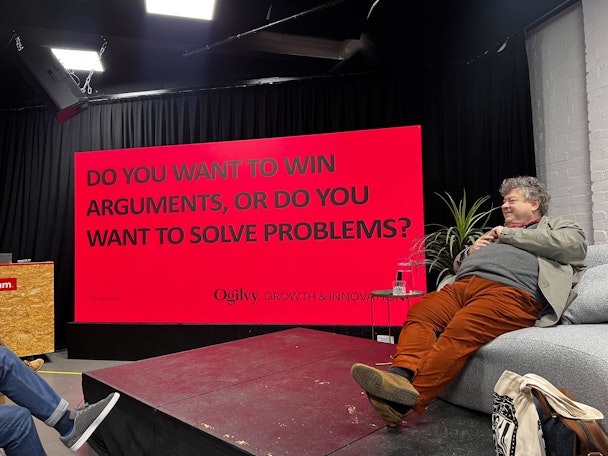Marketing as R&D: Rory Sutherland’s persuasive arguments on the unseen value of marketing
In a compelling lecture at The Drum Labs for the School of Communication Arts, the Ogilvy UK vice chairman challenged the traditional views of marketing with insightful examples and sharp critiques of modern economic assumptions.

Rory Sutherland at The Drum Labs
Rory Sutherland kicked off his lecture by delving into the evolution of Netflix, a company that epitomizes the transformative power of marketing. Before becoming the streaming giant we know today, Netflix struggled to attract customers as a DVD rental service. In the pre-streaming era, it innovated not through technology initially but through a marketing pivot – introducing a subscription model that allowed unlimited DVD rentals without late fees.
“Netflix was desperate; they tried one extra thing with their subscription model, and it went massive,” Sutherland explained. This wasn’t just a promotional tactic; it was a critical piece of research and development that tested a new way to engage consumers and permanently altered media consumption habits.
Sutherland emphasized that marketing should be seen as essential R&D, exploring unknown facets of consumer behavior and testing hypotheses in real-world scenarios. “About 25% of the economy is persuasion. It’s not just making things; it’s about persuading people to want things,” he stated, highlighting the significant role that marketing plays in economic activity.
He pointed out the prevalent mistake in modern business to undervalue anything that can’t be immediately measured. Sutherland used the example of British Airways to illustrate how companies focus heavily on measurable outcomes like ticket sales, often at the expense of aspects like customer service, which, though harder to quantify, have a lasting impact on brand perception and loyalty. “The BA app works beautifully when you’re buying a ticket, but try using it to manage your booking or check-in, and it’s a disaster,” he said, showing how a narrow focus on quantifiable metrics can lead to a neglect of broader customer needs and experiences.
Throughout his talk, Sutherland argued for a broader recognition of marketing’s role as a form of experimental research, essential for discovering what truly resonates with customers. He criticized the narrow focus on immediate, quantifiable outcomes that pervades much of business thinking today. “Most real-world problems aren’t like physics. They’re much messier and require a creative and exploratory approach,” he advised.
Sutherland’s lecture was not just about the importance of marketing but a call to action for businesses to rethink how they integrate marketing with R&D. By recognizing marketing’s role in researching and developing consumer interests and market trends, companies can unlock profound insights and innovations. This approach can lead to groundbreaking shifts that redefine industries, much like Netflix’s redefinition of home entertainment, demonstrating that the unseen value of marketing is indeed its ability to transform the marketplace.

